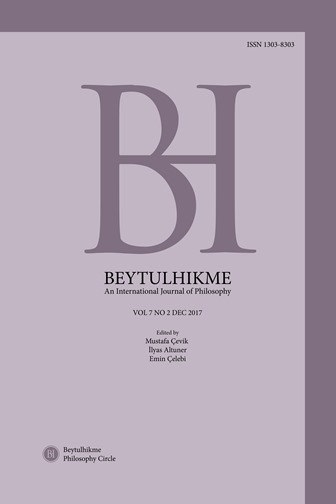Author :
Abstract
Bazı kavramlar merkeze alınarak bir okuma yapmak istendiğinde düşünce tarihinin bütününe dönük kavrayışa ulaşılabilir; varlık, bilgi ve değer bunlardan bazılarıdır. Bizim amacımız felsefe tarihinin bu ve benzeri kavramlar üzerinden bir okumasını yapmak değildir. Gayemiz, erdem, güç, iktidar kavramlarının epistemik ilintileri üzerinden bir tartışma yürütmek, Batı düşüncesi açısından bir iz sürmektir. “Erdem, güç, iktidar” kavramları ilk çağrışımları itibariyle birincisi etiğin, diğer ikisi ise siyaset felsefesinin alanına girmektedir; ancak “erdem bilgidir, bilgi egemen olmaktır/güçtür, bilgi iktidardır” önermelerinde görüldüğü üzere bilgi ortak kavramdır. Malum bu ifadelerin ilki Sokrates’e, ikincisi Francis Bacon’a üçüncüsü de Michel Foucault’ya aittir. Dolayısıyla tartışmamız bu üç filozofun görüşleri temelinde bilgi, değer ve siyaset felsefesi temelinde olacaktır.
Keywords
Abstract
When a reading desired in which some concepts are taken into focus, the entire understanding of the history of thought can be reached; existence, knowledge and virtue are some of these. Our goal is not to read the history of philosophy through these concepts. Our aim is to carry out a debate over epistemic relations of the concepts of virtue, power and government and to take a trail from the thought of West. When it is considered the concepts of ‘virtue, power and government’, virtue is in the field of ethic, and the others are in the field of philosophy of politics. At the same time, as it is seen in the propositions like ‘virtue is knowledge, knowledge is to possess/power, knowledge is power’, knowledge is a common concept. The first statement belongs to Socrates; the second one belongs to Francis Bacon and the third one to Michel Foucault. Hence, our discussion will be based on the philosophy of knowledge, value and politics based on the views of these three philosophers.
Keywords
- Akarsu, B. (1962). Sokrates'te Erdem Düşüncesi. Felsefe Arkivi, 13.
- Akarsu, B. (1962). Sokrates'te Erdem Düşüncesi. Felsefe Arkivi, 13.
- Aristoteles (1944). Politika, cilt 1 (çev. N. Berkes). İstanbul: Maarif Vekaleti.Aristoteles (1946). Politika, cilt 2 (çev. N. Berkes). İstanbul: Maarif Vekaleti.
- Aristoteles (2012). Nikomakhos'a Etik (çev. S. Babür). Ankara: BilgeSu Yayıncılık. Arslan, A. (1994). Felsefeye Giriş. Ankara: Vadi Yayınları.
- Arslan, A. (2009). İlkçağ Felsefesi Tarihi: Aristoteles. İstanbul: İstanbul Bilgi Üniversitesi Yayınları.
- Bacon, F. (1999). Novum Organum (çev. S. Önal). Ankara: Doruk Yayınları. Cevizci, A. (2011). Felsefe Tarihi. İstanbul: Say Yayınları.
- Confrod, F. M. (2003). Sokrates'ten Önce ve Sonra (çev. U. C. Akın). Ankara: Ayraç Yayınevi.
- Foucault, M. (1984). The Politcal Technology of Induvidials in Technologies ofSelf. The Foucault Reader (trans. C. Hubert). New York: Pantheon Books.
- Foucault, M. (1988). Politcs, Philosophy, Culture (ed. E. L. D. Kriteman). London: Routledge.
- Foucault, M. (2000). Hapishanenin Doğuşu (çev. M. Kılıçbay). Ankara: İmge Kitabevi.
- Foucault, M. (2001). Yapısalcılık ve Post Yapısalcılık (çev. Ü. Umaç, A. Utku). İstanbul: Birey Yayıncılık.
- Foucault, M. (2002). Toplumu Savunmak Gerekir (çev. Ş. Aktal). İstanbul: Yapı Kredi Yayınları.
- Foucault, M. (2004). Marx'tan Sonra (çev. G. Aksay). İstanbul: Chiviyazıları.
- Foucault, M. (2012). İktidarın Gözü (çev. I. Ergüden). İstanbul: Ayrıntı Yayınları.
- Foucault, M. (2015). Büyük Kapatılma (çev. I. Ergüden, F. Keskin). İstanbul: Ayrıntı Yayınları.
- Foucault, M. (2016a). Entelektüelin Siyasi İşlevi (çev. O. Akınhay, I. Ergüden, F. Keskin). İstanbul: Ayrıntı Yayınları.
- Foucault, M. (2016b). Özne ve İktidar (çev. O. Akınhay, I. Ergüden). İstanbul:Hacking, I. (2010). Foucault'un Arkeolojisi. Foucault (çev. V. Urhan). İstanbul: Say Yayınları.
- Hegel, G. F. (2004). Hukuk Felsefesinin Prensipleri (çev. C. Karakaya). İstanbul: Sosyal Yayınlar.
- Keenan, T. (1987, February). The Paradox Power and Knowledge. Political Power.MacIntyre, A. (2001a). Erdem Peşinde (çev. M. Özcan). İstanbul: Ayrıntı Yayınları.MacIntyre, A. (2001b). Ethik'in Kısa Tarihi (çev. H. Hünler, S. Zelyut). İstanbul: Paradigma Yayınları.
- Nietzsche, F. (2003). İyinin ve Kötünün Ötesinde (çev. A. İnam). İstanbul: SayOrkunoğlu, Y. (2007). Nietzsche ve Postmodernizmin Gerçek Yüzü. İstanbul: Ceylan Platon. (2013). Devlet (çev. S. Demir). İstanbul: Ataç Yayınları.
- Thilly, F. (2007). Yunan ve Ortaçağ Felsefesi (çev. İ. Şener). İstanbul: İzdüşüm Topdemir, H. G. (1999). Francis Bacon'un Bilim Anlayışı. Felsefe Dünyası, 30.
- Urhan, V. (2013). Michel Foucault ve Düşünce Sistemleri Tarihi. İstanbul: Say Ülken, H. Z. (2001). Bilgi ve Değer. İstanbul: Ülken Yayınları.
- Weber, A. (1991). Felsefe Tarihi (çev. H. V. Eralp). İstanbul: Sosyal Yayınlar.Öz: Bazı kavramlar merkeze alınarak bir okuma yapmak istendiğinde düşüncetarihinin bütününe dönük kavrayışa ulaşılabilir; varlık, bilgi ve değer bunlardanbazılarıdır. Bizim amacımız felsefe tarihinin bu ve benzeri kavramlar üzerindenbir okumasını yapmak değildir. Gayemiz, erdem, güç, iktidar kavramlarınınepistemik ilintileri üzerinden bir tartışma yürütmek, Batı düşüncesi açısındanbir iz sürmektir. “Erdem, güç, iktidar” kavramları ilk çağrışımları itibariyle bi-rincisi etiğin, diğer ikisi ise siyaset felsefesinin alanına girmektedir; ancak “er-dem bilgidir, bilgi egemen olmaktır/güçtür, bilgi iktidardır” önermelerinde gö-rüldüğü üzere bilgi ortak kavramdır. Malum bu ifadelerin ilki Sokrates’e, ikinci-si Francis Bacon’a üçüncüsü de Michel Foucault’ya aittir. Dolayısıyla tartışma-mız bu üç filozofun görüşleri temelinde bilgi, değer ve siyaset felsefesi temelin- de olacaktır.





